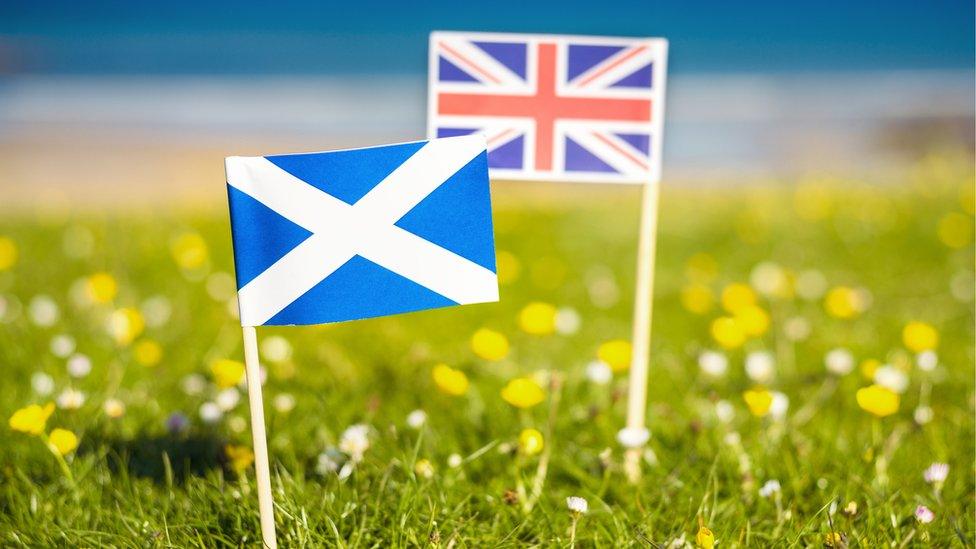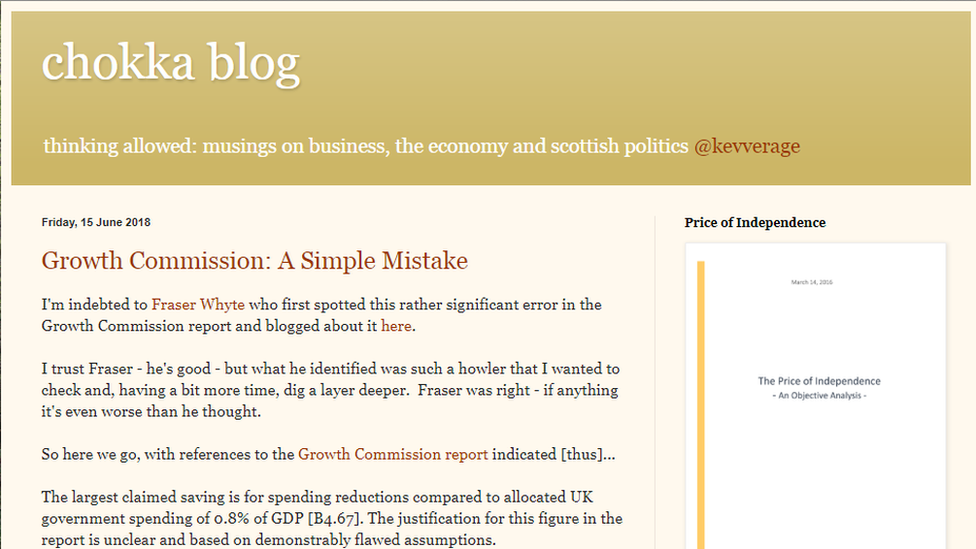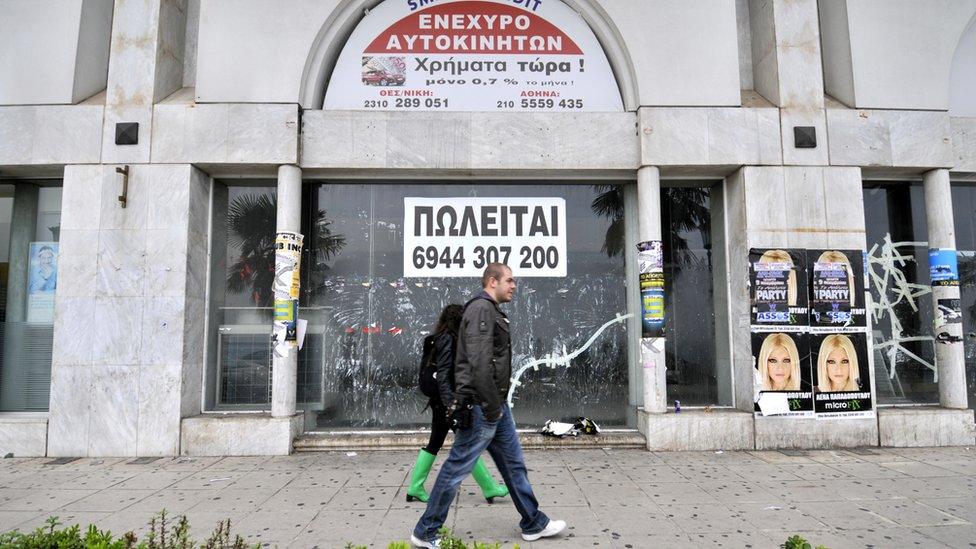Going for growth, or staying for it?
- Published
The Growth Commission set out a new plan for Scotland if it gets fiscal and economic independence. That has brought a vigorous, detailed response from the other side of the debate.
While the fiscal arguments are disputed, the ideas for growth lack detail. And Andrew Wilson's commission is challenged to show which of them could not work within the UK.

Two strands of debate are developing over summer on the independence side of Scottish politics.
One is when and how to get to another referendum. Expect that to continue until one happens.
The Brexit burach at Westminster is fuelling expectations that enough stonework can be dislodged from Big Ben to bring the edifice crashing down.
The other part of the debate is trickier: what is the offer to be? You'll recall that the Sustainable Growth Commission, set up by Nicola Sturgeon (as SNP leader, not as first minister) and chaired by former MSP Andrew Wilson, gave a bracing dose of updating to the fiscal position an independent Scotland would inherit.
That was the target of bringing the deficit down to 3% of national output, with an illustrative set of figures that would increase spending but by less than real terms growth, meaning a renewed squeeze on spending for a further nine years.
To jog your memory further, that led to a dispute about whether that meant "austerity" continuing or not - a debate muddied by a lack of agreement on what austerity means. The Institute of Fiscal Studies observed that it looked suspiciously like austere times in view.
Well, there's another response published with the new week, which will give the SNP's assemblies of party faithful something to chew on as they gather and discuss how to handle the Growth Commission report.
Said faithful were far from universal in their delight at being told by Mr Wilson that jam is to be for quite a few tomorrows away. They don't like oil and gas revenue being put aside, rather than helping to balance the annual books.
The new response is from someone who casts a sceptical eye over the SNP's claims for independence. Kevin Hague is an East Lothian-based businessman, who got interested in the debate when he set about reporting to his board of directors on the economic and fiscal plans during the 2014 referendum campaign. He didn't rate or like what he found, and got blogging.

His "chokkablog" online analysis of SNP plans, often extravagantly illustrated with graphs, have earned him respect as well as online abuse. As others have shown on the pro-independence side of the debate, one-man bands can break through the noise of new and social media to be heard.
In this case, it has broken through as a compilation of Hague's writings, published by the These Islands grouping and think tank of Indy-sceptics, of which Mr Hague was himself a founder and is now chairman. It exists to stake out the territory of common bonds across Britain and Ireland, and to better define the case for keeping the UK united.
The paper is a lengthy and detailed one. You can read it for yourself. And better still, you can set it against the Growth Commission report, which we reported in some detail two months ago.
For a taster, read on, across some of the main themes:
The issue which first grabbed attention back in May was the acceptance that an Indy Scotland would have to continue using the pound, for at least 10 years or so. That's the least of Kevin Hague's concerns. He sees it as "symptomatic of the weakness of the economic case for independence".
On that question of austerity, there's short shrift. Not only would the next decade look tight, but applying the commission's rules of fiscal management, it's reckoned that the past decade for an independent Scotland would have been tighter than it has within the UK.
While that may be logical, the Wilson Report doesn't dwell on the past decade, avoiding discussion of what might have been.
'Selective' comparisons
Comparison with other small countries, which is where the Growth Commission takes us, confronts us with the uncomfortable requirement on most of their governments that they should run a surplus in most years. That much is conceded in the report.
Kevin Hague's paper argues that deficits are easier to manage for bigger countries. And building up reserves to back a new Scottish currency would require several years of such surpluses. If that is the case, the 3% deficit target is far from sufficient, and the spending squeeze would have to be tighter still and more "aggressive".
The assumptions on spending are described as more optimistic than the 2013-14 White Paper, on which the referendum was largely fought. That's not presented as a compliment.
Savings are claimed at £2.6bn from day one, comparing with £0.6bn when Alex Salmond set out his stall. For Andrew Wilson and his commissioners, these are described as "sweeping assertion, rounding up and double counting", plus a disagreement in the use of the Scottish government's figures on revenue and expenditure. (At least the two sides are agreed they can start the debate from those GERS figures.)
It is the growth bit of the Growth Commission that has had rather less attention in commentary so far. Kevin Hague wishes to make up for that.

These Islands cites Greece of an example of a small country where growth is sluggish
He starts by pointing that there should be no surprise if the Scotland economy grows more slowly than the Commission's selection of comparable fast-growing small nations. If they're chosen because they all grow faster, then the average will surely be faster. If slower growing smallish countries (for instance, Greece and Portugal) are added to the mix, then Scotland can be seen to be doing not so badly.
The Commission intention was to set out an ambition to catch up with the best in class. But its assertion that small countries grow faster isn't backed up, says These Islands - not when the comparable group of large countries includes the fast AND the slower.
And how to grow faster? Well, that's perhaps why there hasn't been so much commentary. The Wilson report proposes seven further reviews, five new agencies, three further commissions, two new institutions and a national brand strategy.
Mr Wilson warned on the possible consequences of taxes being raised higher than competing countries, but avoided taking a position on what levels of tax and spending should be.
It is unclear how you get from those to an illustrative case for an independent Scotland in which it not only catches up with similar, but faster-growing countries, but out-performs them by one percentage point for 15 straight years.
Where Kevin Hague returns to his starting point, he suggests that the outcome of the Wilson report is to make a reasonable economic case for the UK's status quo. He urges Andrew Wilson to go back and assess how many of the report's recommendations could also be achieved without independence.
Debated on Good Morning Scotland , external (listen at 1'50") Westminster SNP MP Kirsty Blackman responded by pointing to the lack of immigration powers in Holyrood as a source of potential, unleashed vigour to boost the growth rate beyond the small advanced comparators.
It wasn't much of a structured response, though it was as short as radio interviews tend to be.

The impact of Brexit is a "big unknown"
As a pointer to the future of the debate from the SNP's point of view, she provided a list of higher costs through being in the UK: the claim of higher state pension costs in the UK to subsidise those from outside Scotland who live longer on average, and HS2 high-speed rail. (I thought, however, that was something the Scottish government wants to see built and extended north of the border.)
Where they both agreed, inadvertently, was in the biggest "known unknown" the economy currently faces. Andrew Wilson and his commissioners chose not to speculate on the outcome of Brexit for economic performance. Kevin Hague found that a stunning omission. Kirsty Blackman quoted figures that highlighted a relatively large risk from constitutional UK/EU change that's already in the pipeline.
It's not for me to adjudicate between these arguments. But having commended Andrew Wilson two months ago for a serious-minded and valuable contribution to debating Scotland's future, I'll do the same for Kevin Hague.
LATER: Kevin Hague has pointed out that the second to last paragraph does not accurately reflect his take on Brexit. His criticism is this: while the Growth Commission highlights its concerns about the potential economic cost of Britain removing itself from the EU, it cannot ignore the potential cost to the economy of Scotland removing itself from the United Kingdom.
- Attribution
- Published20 July 2018
